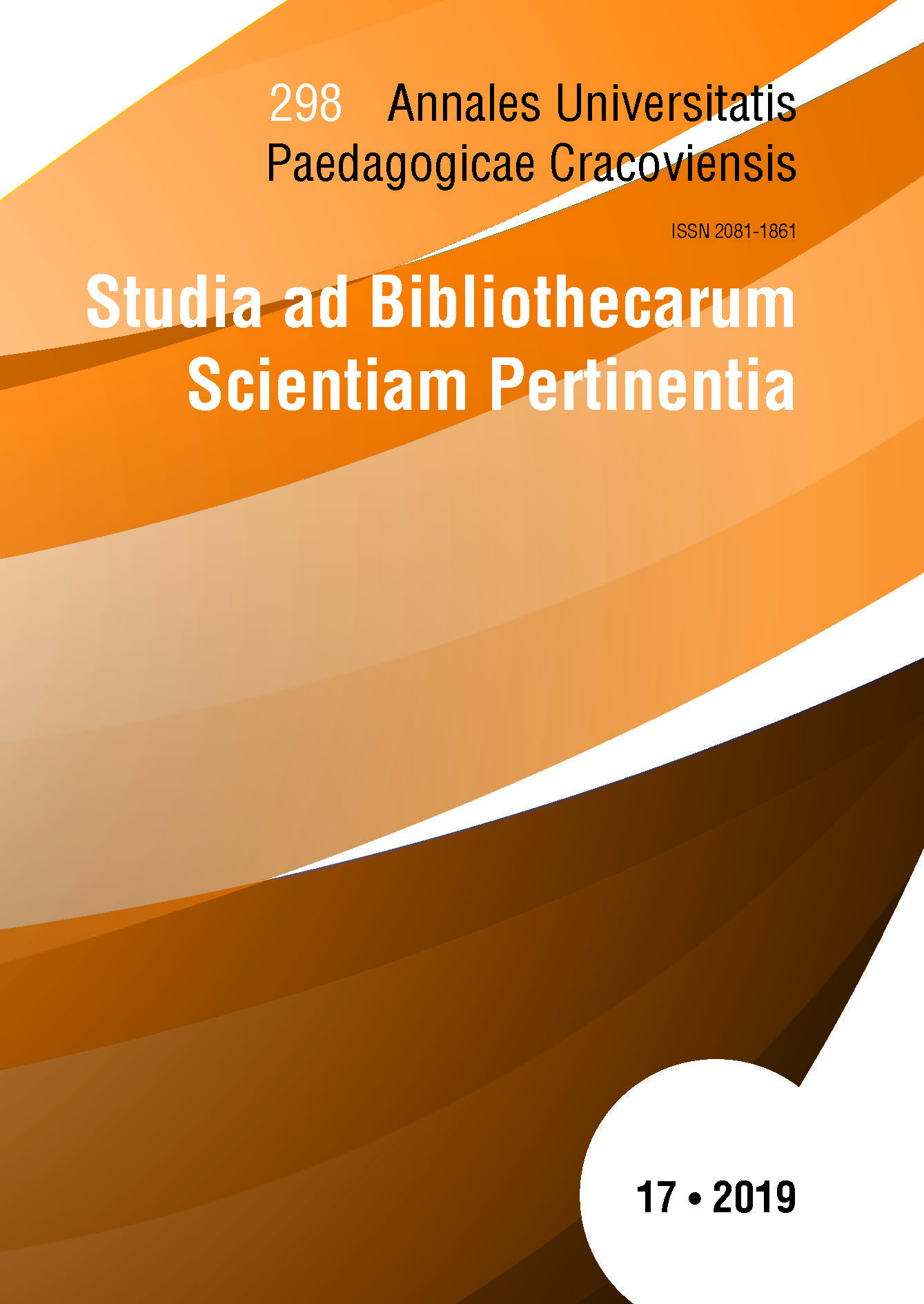Książka irlandzkojęzyczna jako narzędzie kształtowania kultury narodowej nowego państwa
DOI:
https://doi.org/10.24917/20811861.17.11Słowa kluczowe:
Ireland; Irish; Irish literature; censorship; Irish bookAbstrakt
The result of the Irish struggle for autonomy and the abolition of centuries of dependence on English rulers was the creation of the Irish Free State in 1922 (Irish Saorstát Éireann). Like other European nations, in striving for independence, the Irish often used the historical argument, citing the separateness of their own culture. One of its elements is the language and the book culture associated with its use. This article introduces the book policy adopted by the government of the new state at a time when Irish was out of use and points out some of the problems associated with the creation of Irish-language literature, including a small number of authors writing in Irish and the lack of language and publication standards. In addition, the situation in the Irish-language book was complicated by censorship resulting from the recommendations of the government, which treated the book as a tool not only in language planning, but also in shaping the wider culture of Ireland - its ethos and the image of a citizen of a new state. The Irish book is also presented as a carrier of symbols important for Ireland, and actions taken to revive Irish culture are shown in a broader context by comparing some aspects of Irish history to the situation in Poland after independence.
Bibliografia
Campbell J., Brexit: What is the Irish border backstop?, BBC News, 1.08.2019, https://www.bbc.com/news/uk-northern-ireland-politics-44615404
Cisło A., Odrodzenie irlandzkiej książki etnicznej i jej rola w kształtowaniu kultury nowego państwa, Wrocław 2018
The Constitution of the Irish Free State (Saorstát Eireann) Act, 1922 and Public General Acts passed by Oireachtas of Saorstát Eireann during the year 1922, https://celt.ucc.ie/published/E900003-004/text002.html
Constitution of Ireland (Original Text), https://en.wikisource.org/wiki/Constitution_of_Ireland_(original_text)
Curtis L.P. Jr, Apes and Angels: The Irishman in Victorian Caricature, Washington 1971
De Fréine S., The Great Silence: The Study of a Relationship between Language and Nationality, Dublin-Cork 1978
Estlake J., Orality and agency: Reading an Irish autobiography from the Great Blasket Island, „Oral Tradition” 24, 2009, nr 1, s. 125–141
Gibbons M. , The Gaeltacht bilingual, „The Irish Monthly” 60, 1932, s. 684–688
Hroch M., Małe narody Europy, tłum. G. Pańko, Wrocław-Warszawa-Kraków 2003
Kaplan R.B., Baldauf R.B. Jr, Language Planning from Practice to Theory, Clavedon 1997
Kiberd D., Inventing Ireland, London 1995
Lee J.J., Ireland 1912–1985: Politics and Society, Cambridge 1989
Lynam E.W., The Irish Character in Print 1571–1923, Shannon 1969
McGuinne D., Irish Type Design: A History of Printing Types in the Irish Character, Blackrock 199
Ciosáin N., Creating an audience: Innovation and reception in Irish language publishing, 1880–1920, [w:] The Irish Book in the Twentieth Century, red. C. Hutton, Dublin-Portland OR 2004, s. 5–15.
Ciosáin N., Print and Irish, 1570–1900: An Exception among the Celtic languages?, „Radharc” 5, 2004–2005, nr 7, s. 73–106
Conchubhair B., An Gúm, the Free State and the politics of the Irish language, [w:] Ireland, Design and Visual Culture: Negotiating Modernity, 1922–1992, red. L. King, E. Sisson, Cork 2011, s. 93–113
Criomhthain T., An tOileánach, Baile Átha Cliath [Dublin] 1929
Criomhthain, Tomás (1855–1937), https://www.ainm.ie/Bio.aspx?ID=713
Drisceoil D., A dark chapter: Censorship and the Irish writer, [w:] The Irish Book in English 1891–2000, „The Oxford History of the Irish Book” 5, red. C. Hutton, P. Walsh, Oxford 2011, s. 285–303
Giollagáin, C., Mac Donnach S., The Gaeltacht today, [w:] A New View of the Irish Language, red. C. Nic Pháidín, S. Ó Cearnaigh, Dublin 2008, s. 108–120
Ailín T., Irish revival movements, [w:] A View of the Irish Language, red. B. Ó Cuív, Dublin 1969, s. 91–100
Eithir B., Historia Irlandii, tłum. M. Raczkiewicz, Warszawa 2000
O’Leary P., Gaelic Prose in the Irish Free State 1922–1939, University Park PA 2004
Murchú H., Ó Murchú M., Irish Facing the Future, Dublin 1999
Murchú M., Language and Community, Dublin 1970
Riagáin P., Language Policy and Social Reproduction: Ireland 1893–1993, Oxford 1997
Súilleabháin M., Fiche Blian ag Fás, Baile Átha Cliath [Dublin] 1933
O’Sullivan M., Dwadzieścia lat dorastania, tłum. M. Goraj, E. Bryll, Warszawa 1986
The Oxford Companion to Irish Literature, red. R. Welch, Oxford 1996
Uí Laighléis G., An Gúm: The early years, [w:] Celtic Literatures in the Twentieth Century, red. S. Mac Mathúna, A. Ó Corráin, Moscow 2007, s. 199–216
White T.J., The impact of British colonialism on Irish catholicism and national identity: Repression, reemergence and divergence, „Études irlandaises”, 35-1, 2010, https://journals.openedition.org/etudesirlandaises/1743
Williams N.J.A., Gaelic text and English script, [w:] Oral and Print Cultures in Ireland 1600–1900, red. M. Caball, A. Carpenter, Dublin 2010, s. 85–101
Pobrania
Opublikowane
Jak cytować
Numer
Dział
Licencja
Prawa autorskie (c) 2019 Annales Universitatis Paedagogicae Cracoviensis | Studia ad Bibliothecarum Scientiam Pertinentia

Utwór dostępny jest na licencji Creative Commons Uznanie autorstwa – Użycie niekomercyjne – Bez utworów zależnych 4.0 Międzynarodowe.

